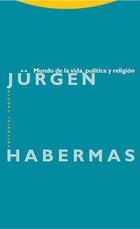In this second installment of his work postmetaphysical Thought, Jürgen Habermas attempts to determine the meaning of philosophy after the crisis of his epistemological privilege over other disciplines and after questioning the dominance of theory over practice. Three major issues are addressed in this context: the change of perspective from images of metaphysical life to the world of world; the relationship between religion and postmetaphysical thought, and the role of religion in the political context of a post-secular and liberal society.
In the trend towards economic globalization and digital communication companies in Europe, mostly secularized, they encounter religious movements and fundamentalisms of growing vitality. This has not only given another direction to scientific and social debate on the relationship of secularization with the modernization of society, but...read more
Shopping cart
Loading cart
Important notices
|
|
Recordando a André Rouillé: Su legado en la fotografía André Rouillé 1948 - 2025 |
|
|
Libros de filosofía y co. Disponibles en Librería Herder |
|
|
Revista Filosofía & Co. nº 9 Nueva revista de filosofia divulgativa y actualidad |
|
|
"Espacios de la filosofía" - Mauricio Beuchot - Novedad Herder México |
|
|
Revista Filosofía & Co. nº 8 Nueva revista de filosofia divulgativa y actualidad |
Pay safely with:


In the webshop
New
|
|
La profecía en la antigüedad 70531 $900.00 -0.00% $900.00 |
|
|
Simone Weil y la cuestión judía 70530 $470.00 -0.00% $470.00 |
|
|
Medios calientes 70159 $400.00 -0.00% $400.00 |
|
|
El bestiario de Michel Foucault 70404 $749.00 -15.00% $636.65 |
|
|
Cantan los ángeles, rugen los monstruos 69202 $510.00 -0.00% $510.00 |
In the press
Promotions
|
|
Panorama A1.1, Deutsch als Fremdsprache Übungsbuch 36726 $235.00 -35.00% $152.75 |
|
|
Diccionario de términos filológicos 70241 $900.00 -25.00% $675.00 |
|
|
Verbos conjugados $600.00 -25.00% $450.00 |
|
|
Prosa y poesía. Homenaje a Gonzalo Sobeja 70242 $1,755.00 -25.00% $1,316.25 |
|
|
Lingüística española aplicada a la terapia del lenguaje 70239 $300.00 -25.00% $225.00 |





